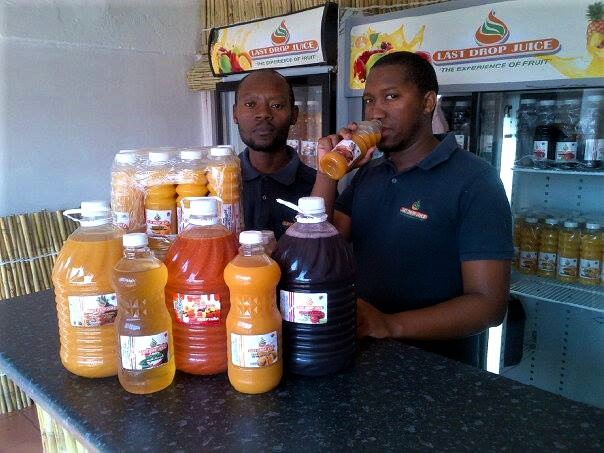Business planning
When life gives you lemons, make lemonade

In 2012, Sizwe Dladla was unemployed with R1,600 to his name. Instead of using the money to buy groceries, Sizwe decided he needed to make his Rands go further. So, he took a leap of faith and started a business: Last Drop Juice.
“I grew up in Orlando West in Soweto where different generations of one family often live together under one roof,” says Sizwe. “I hit on the idea of producing pure fruit juice as everyone of all ages can enjoy it. And the one thing most households have is a fridge.”
Armed with his R1,600, Sizwe bought a box of fruit concentrate and two plastic containers from Nampak: a 5L barrel and a 250ml bottle. It was a significant risk, but one that was worth taking. Starting small and pushing a desirable, well-priced product delivered a good financial return, which Sizwe immediately reinvested in the business.
Today, Last Drop Juice is well-known for its consistent quality and supplies restaurants, workplace and university canteens, private hospitals, as well as two Pick n Pay supermarkets. It still delivers to households and has also opened 2 stores, employing seven people.

Humble beginnings
“I didn’t pay myself a salary for two years,” says Sizwe. “Every cent went into building the business. Because I only delivered directly to households back then, I soon had too many customers to reach by foot. One of my first expenses was a bicycle that could get me and the juice around the neighbourhoods faster.”
With an initial mode of transportation sorted, Sizwe developed a busy work schedule: on Mondays, he bought the containers from Nampak; on Tuesdays, he mixed the juice and filled the containers, and on Wednesdays, Thursdays and Fridays, he made deliveries. He was doing well, but next on his to-do list was to improve his product recipe. His juice needed to be just right to stand out and give his customers a delicious, memorable, and value-for-money experience.
“Fortunately, I discovered I have a passion and curiosity for manufacturing,” says Sizwe. “I really applied myself to finding and creating new and better ways of making my juice. I realised that good relationships with good suppliers are like gold and focused on establishing procurement networks with reliable companies in the Cape that could give me the raw material I needed.”
Quality control
Last Drop Juice uses only pure fruit pulp, which needs to be kept frozen. But the colder it gets, the thicker it gets, which can affect the juice’s consistency – which affects the drinking experience.
“I didn’t expect temperature control to be one of my biggest business challenges,” says Sizwe. “The juice needs to be manufactured and stored at just the right ambient; otherwise, it doesn’t feel right when drinking it.”
Sizwe’s energy and efforts into building strong business networks have paid off. A fridge manufacturing company sponsored the business with an industrial fridge, which helps Last Drop Juice preserve its flavour and freshness and deliver a truly fruity experience.
A thirst for success
There’s no doubt that ambition and determination are crucial to entrepreneurial success, but as Sizwe can attest to, SMEs also need practical skills and support to get ahead. Two pivotal events that boosted the Last Drop Juice business were:
- SEDA, a government institution, provided Last Drop Juice with funding to test its product’s nutritional quality through SABS. This nutritional verification bolstered Sizwe’s confidence which helped him approach bigger customers.
- In 2016, Nampak elected Last Drop Juice for enterprise development. Sizwe secured a loan and equipment, including a stainless-steel tank, which helped boost production. Association with, and acknowledgement by, the Nampak brand has helped propel the business to the next level.
Khulisa iBiznis
Last Drop Juice was also one of the 196 SMEs chosen to participate in Khulisa iBiznis, a funding accelerator programme run by the South African Institute of Chartered Accountants (SAICA). The 12-month programme empowered participants with business skills such as financial management, funding options, and sustainability tactics.
Sage is a proud sponsor of Khulisa iBiznis. To help the participating SMEs manage their money going forward, Sage provided each one with a one-year license to use its cloud-based accounting software.
“The programme taught me a lot,” says Sizwe. “But if I had to break it down to the two top skills I walked away with, they are: managing cashflow and leveraging consignment stock.”
Tips for aspiring start-ups
- You don’t need lots of money to get going. Start with what you have and start small. Don’t expect to secure funding from the government or elsewhere before you’ve shown that you can do it against all odds. Work hard and be patient.
- Consistency counts. Don’t try to do too much too soon. What matters is producing something of quality and getting the product to your customers on time. To do this, you need to build solid business relationships all along your supply chain.
- Create an experience. No product or service will sell well unless you create a memorable customer experience that keeps people coming back for more. “Last Drop Juice uses pure fruit pulp – nothing artificial. When you drink our juice, you don’t just taste the real granadilla or orange; you really experience it.”
- Pay attention to the numbers and plan. Work with a bookkeeper to stay on top of your cash flow and plan! Suppliers secure their stock for customers well in advance, so make sure you can provide them with a realistic projection of your business’s needs in time to fulfil your orders.
- Don’t get too comfortable. Just when you think things are going smoothly, life will throw you another lemon. “The COVID-19 pandemic hit businesses hard – including ours. As entrepreneurs who employ people, we need to have a turnaround strategy to keep everyone earning when things get hard. With everyone stuck in their homes during the lockdown, our corporate clients scaled back demand. So, we went back to our roots, bought a motorbike, and ramped up our home delivery service.”
A juicy future
The pandemic’s impact on Last Drop Juice reminded Sizwe that long-term business success needs a careful plan.
“The business lost a few customers during the lockdown, but it also gained new ones,” says Sizwe. “Nothing stays the same, so it’s important to be a specialist in your field. With information, knowledge and networks, you can pivot operations more smoothly and stay ahead.”
Sizwe plans to expand his business and “build an empire”. This includes renovating the existing stores and, later this year, selling franchises and introducing a new product: drinking yoghurt. He also acknowledges that an accountant would help keep an eye on the numbers.
“Sometimes, entrepreneurs are so focused on the product that they lose sight of the other stuff like procurement, sales forecasts, and monthly targets. Some of it is important and some of it is urgent – depends on the context and time of the month. An accountant by my side will add enormous value to Last Drop Juice.”
Underlying everything, though, is Sizwe’s commitment to consistency and quality. At the end of the day, customers and cash flow are kings.







Ask the author a question or share your advice